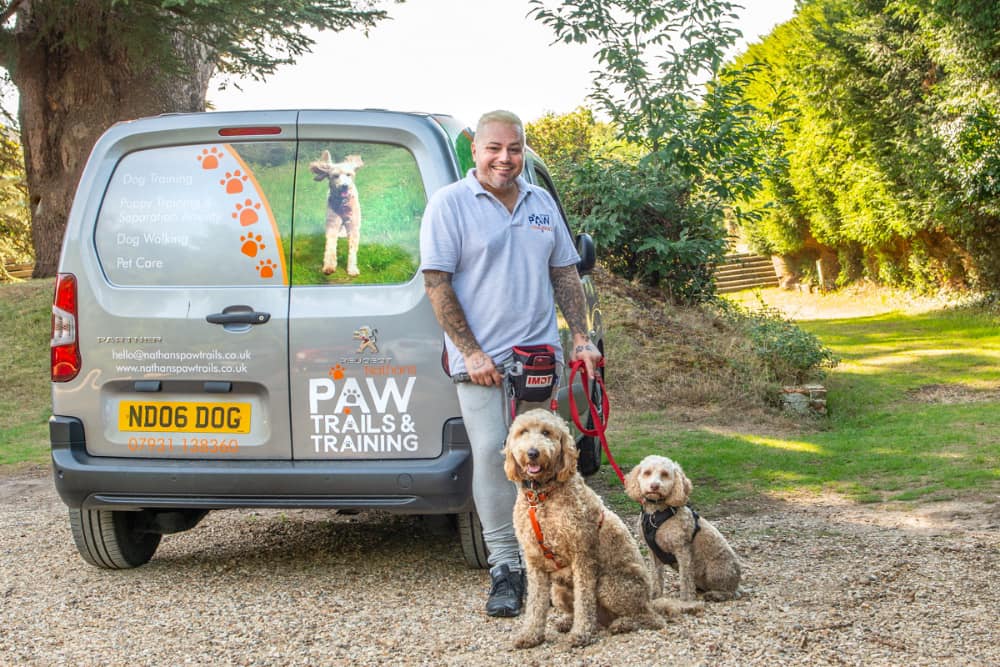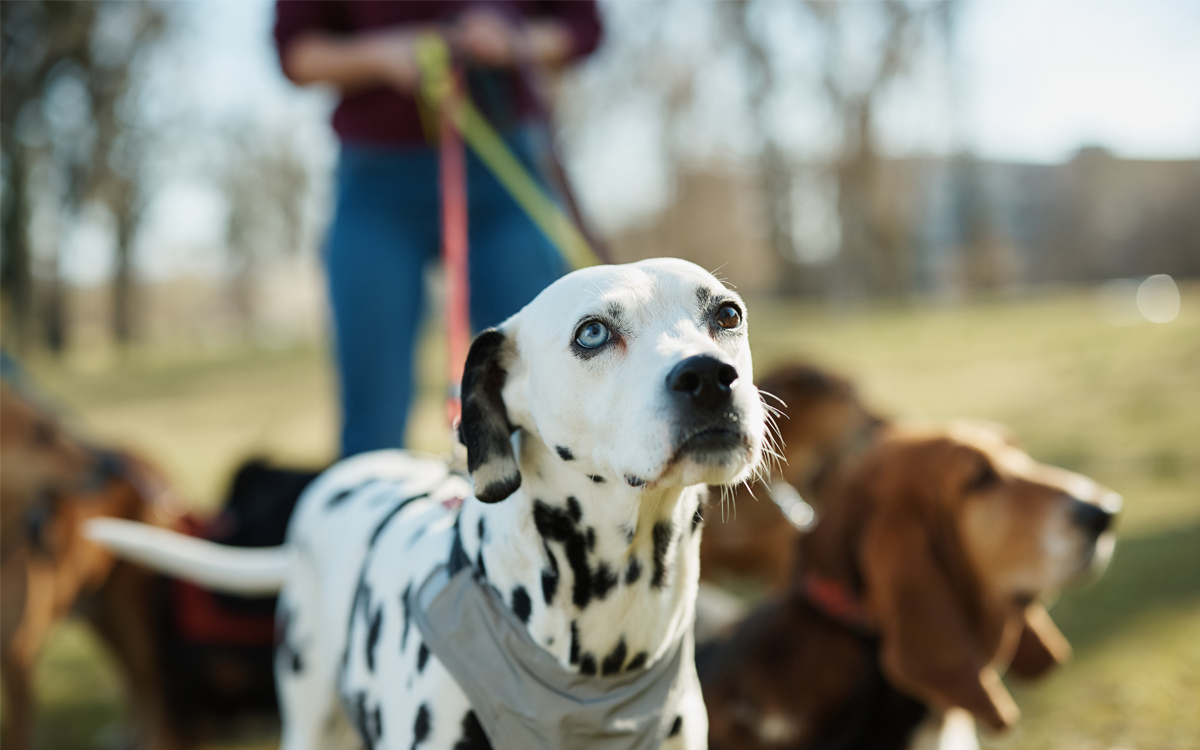Finding the right professional dog walker is an important choice for your dog’s health and happiness. With busy lives, it can be tough to give your dog all the walks they need. A good dog walker does more than just walk; they can be like a second parent to your dog and will go above and beyond for your pup.
As a dog owner, it’s essential to be transparent and honest about your dog’s behaviour, needs, and quirks. This honesty ensures that your dog walker is well-prepared to provide the best possible care. Remember, a good relationship with your dog walker translates into quality care.
In this blog, We’ll look at what your dog needs, and how to find a walker who’s got the right experience. This way, whether your dog is young or old, active or calm, you can be sure they’re in good hands when you’re not around.

Benefits of hiring a professional dog walker
Hiring a professional dog walker offers several advantages. It ensures your dog gets enough exercise for their physical and mental health. A professional walker provides routine walks, especially useful when you’re busy or at work allowing you to crack on!
Regular walks with a professional can also help in improving your dog’s socialisation and reducing behaviour issues. With a professional dog walker, you gain peace of mind knowing your dog is well-exercised and cared for.
Factors to consider when choosing a professional dog walker
When looking for a professional dog walker, it’s important to consider these important factors. First, assess their experience and skills, especially regarding different dog breeds and walking experience, as this ensures a good fit for your dog.
Always verify their reliability and trustworthiness through references and reviews. Take a look at their website and check to see if they have reviews on their social media or Google My Business Page when you put their company name into the google search bar.
Their walking style and chosen routes should suit your dog’s energy levels and needs. Some may specialise in small dogs only or working breeds like Spaniels or Labradors. They may walk in local parks or prefer to walk dogs in secure dog fields which they hire by the hour or drive out of the way for country rambles or sea side adventures!
Communication is also important for regular updates to let you know how your dog is doing. They should also understand the importance of security due to the rise in dog theft. Additionally, make sure to choose a walker who uses force-free, compassionate care techniques, avoiding any who use prong collars, E-collars, correction sprays, or other aversive tools, as these will hurt and distress your dog. If a walker uses what is known as “balanced” dog training methods, it’s best to look elsewhere.
How to find the best dog walker for your dog’s needs
Finding the perfect dog walker for your dog is all about knowing where to look and what to consider. Start by asking for recommendations from friends or neighbours who might know professional and reliable walkers.
Your dog walker will want to meet you and your dog to see if you are a good fit together. They will want to discuss your dog’s specific habits so you should be completely open and honest about your dogs personality and needs. This way, your dog walker will know how to make your dog feel comfortable and happy and his walks fulfilling.
Consider doing a few trial walks to see how things go.
Questions to ask a potential dog walker
When you’re meeting a potential dog walker, here are some good questions to ask:
- How much experience do you have with dog walking?
- Can you handle dogs with special needs or behaviours?
- What’s your plan if there’s an emergency?
- How many dogs do you walk at one time?
- Can you provide references from other dog owners?
- How do you communicate with pet owners about their dogs’ walks?
- What are your rates and what services are included?
- How do you transport the dogs in your care safely?
Asking these questions will help you understand if they’re the right fit for your dog’s needs and your peace of mind.
How to assess a potential dog walker’s qualifications and experience
To evaluate a dog walker, begin by asking about their experience and background in dog walking and pet care. Find out how they’ve worked with various dog breeds and if they’ve had special training. Understanding their approach to dog behaviour, safety, and handling emergencies is so important.
Check if they have pet care certifications and memberships in professional associations and of course, Yappily! This helps you get a full picture of their skills and how well they’ll take care of your dog.
The safe transport of dogs is super important. There are laws and regulations in effect that require dogs to be restrained while travelling in vehicles. Failing to comply with these laws may result in fines and penalties. Plus, if you’re in an accident and can’t show you complied with this law, your insurance might not cover it. Rule 57 of the Highway Code states ‘When in a vehicle make sure dogs or other animals are suitably restrained so they cannot distract you while you are driving or injure you, or themselves’ if you stop quickly. A seat belt harness, pet carrier, dog cage or a dog guard are all different ways of keeping dogs contained and safe in cars. Pay attention to see if there are provisions in place to keep dogs cool whilst in transit. Dogs can suffer heat stroke very quickly and this can prove fatal. No air con? No dog walk!
Some local councils require dog walkers to hold a special dog walking licence. For example, Wandsworth borough council in London, require anybody who walks over 4 dogs in a professional capacity to have a special dog walking licence with is enforced by the local parks police. Your council may even have a list of these walkers, so it’s definitely worth contacting your local council or checking their website for more info.

What qualifications and other assurances should you expect to see?
At the very least, any dog walker you engage for their services should have the following;
- Insurance. A professional dog walker should have the appropriate insurance in place. Having the right insurance is a must for a professional dog walker. This insurance protects both your dog and the walker in case of accidents or unexpected situations. For example, if your dog gets injured while on a walk, or if your dog accidentally causes damage or harm, the insurance should help cover the costs. It’s a sign that the walker takes their job seriously and is prepared for various scenarios. So, always check that your dog walker has appropriate insurance coverage!
- DBS Check. Ask to see a recent DBS check. A DBS check, which stands for Disclosure and Barring Service check, is important when choosing a dog walker. This check provides a record of a person’s criminal history if they have one. Asking to see a recent DBS check is a good way to ensure that the dog walker you’re considering is trustworthy and has no history of criminal behaviour. It’s a safety measure that gives you more confidence in allowing them to take care of your dog, especially since they’ll often be in your home or with your dog unsupervised and will need keys to collect your dog if you are not around. In simple terms, a DBS check helps you make sure that the person looking after your dog is safe and reliable.
- Canine first-aid certificate. A canine first-aid certificate is an important qualification for a dog walker. This certificate shows that they have been trained to handle medical emergencies that might happen to a dog while on a walk. This includes things like what to do if a dog gets injured, has an allergic reaction, or chokes. Having this certificate means the dog walker is prepared to provide immediate care until professional veterinary help can be reached. It’s a sign of a responsible and well-prepared walker, giving you peace of mind that your dog is in safe hands, even in case of an emergency.
- CPD ( Continued Professional Development ) CPD is important for a dog walker. It means they are continuously learning and improving their skills. This could include taking courses on dog behaviour, new training methods, dog body language or anything else that helps them provide better care for dogs. A dog walker who engages in CPD shows that they are dedicated to their job and staying up-to-date with the best practices in dog care. It’s a good sign that they are committed to providing the highest quality service for your pet.
- Terms and conditions contract. Dog walking should not be a “back of a fag packet” cash-in-hand job. It’s a profession and as such a professional walker will have a proper contract in place detailing what you can expect from them and they from you. There will also be a booking in form either on paper or electronically, which will have every detail about your dog along with the vet’s details, medication if needed, vaccination records and emergency contact.
Are the professional dog walkers on Yappily vetted?
Absolutely!
At Yappily, professional dog walking is our expertise. Our founders, with over 15 years of experience as successful dog walkers in London, set high standards for professional dog walking services.
Yappily thoroughly vets every applicant wishing to be listed in the directory, ensuring they meet our strict criteria. This includes having a minimum of one year of experience in walking multiple dogs, first aid training, and a recent DBS check. We also emphasise and endorse continuous learning and mentorships, requiring dog walkers to regularly update their skills through courses or webinars.
Lastly, every dog walker must read and agree to the Yappily code of ethics, agreeing to the highest level of service and compassionate care.
Home Dog Boarding & Dog Daycare
It’s worth noting that Dog Daycare and Home Dog Boarding require a council licence in England and Wales, so if a dog stays at the caregiver’s home, boarding or doing daycare without one could end in a criminal conviction. Yappily will only list a business or individual as a home dog boarder or daycare provider if they have a council licence to do so.
Conclusion
Entrusting your dog to someone else can be challenging, but with the tips we’ve shared, you can confidently start this journey. The time and effort you invest in finding the right dog walker to collaborate with and help you care for your dog is so worth it.
Finding the ideal dog walker is more than just a matter of convenience; it’s about creating a trustworthy and respectful partnership. So go forth with your new found knowledge and find yourself the best Dog Pro in your area!



Add a comment